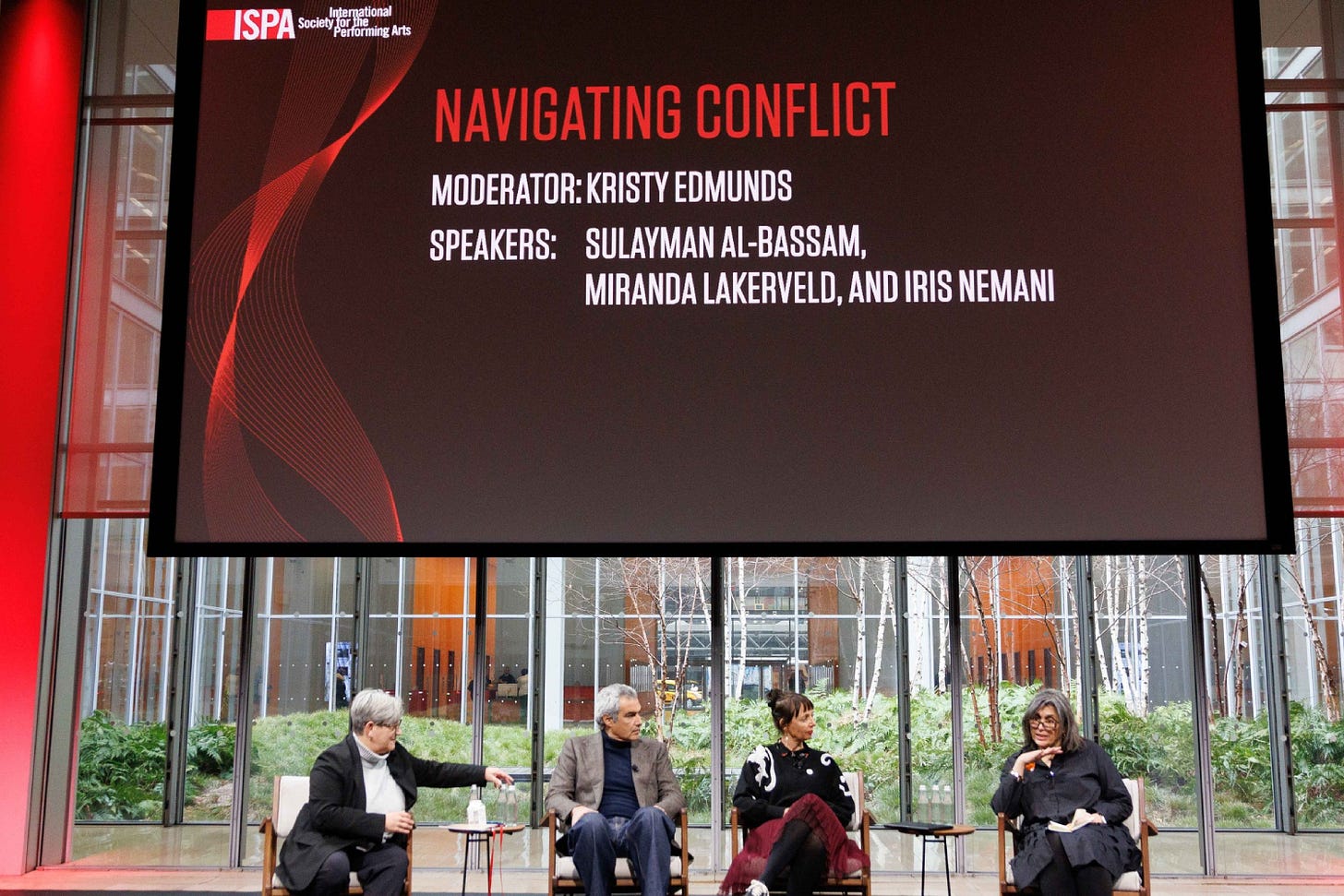ISPA, APAP, AND THE GLOBAL ANXIETIES OF 2025
What the world is worried about, as revealed by New York's big arts events earlier this month
Welcome to your weekly guide to the global theater industry. New to Jaques? Check out this handy explainer.

Every January in New York, the tourists leave—but the arts professionals descend en masse.
Each year, hard on the heels of the holiday season, a loosely affiliated clump of conferences and festivals brings to town an international cadre of artists, administrators, academics, and top leaders in the performing arts. It’s a mass convening anchored by APAP|NYC, the nearly 70-year-old conference hosted annually by the Association of Performing Arts Presenters, and encompassing the yearly New York Congress of the International Society for the Performing Arts (ISPA) and the Under the Radar festival of experimental (and often international) new work, among other annual events.
We’re talking thousands of people here: This year’s attendees list for APAP alone hit 2,925 from 34 countries and five continents, with more than 300 expo booths on the convention floor and 1,000+ showcase performances, all hoping to attract the interest of producers, presenters, and funders. ISPA tallied 570 delegates from more than 55 countries. And that’s not even counting everyone involved in the 33 shows at Under the Radar, the nine productions in the Prototype festival of experimental opera, and all the other events that fall under the banner of JanArtsNYC.
For those few weeks in January, New York City becomes a showcase, a marketplace, a networking opp, a think tank, and a magnet for movers and shakers from all walks of the international performing arts scene. By the time the month is over, you’ve got a pretty good sense of what’s on the minds of the world’s arts professionals.
That’s what I’ll tease out here in this SPOTLIGHT STORY: the trends, the topics, the themes, and, notably, the anxieties that emerged from this month’s two headline events—the APAP and ISPA conferences—plus a handful of the many performances around the city. You’ll learn:
how the arts world is grappling with the dangers of AI—and its opportunities,
the burgeoning shift in how thought leaders approach audience development,
the difficulties of securing artist visas and how the second Trump presidency threatens to make the process even harder,
the perils of navigating censorship, surveillance, and social media in a time of conflict, and
the creative themes poised to influence arts programming in the coming seasons.
During the first session of the ISPA Congress, Mariko Silver—who, as the new CEO and president of Lincoln Center for the Performing Arts, runs one of the most prominent arts complexes in the world—described the current moment as “a time of intense unraveling.” Here’s what the arts world is thinking as they face it head-on.
VISAS AND IMMIGRATION: BRACING FOR IMPACT
Will the Trump administration make it harder to get an American visa for a visiting international artist? Probably so—and it’s already tough to begin with.
That was the takeaway from a panel discussion at APAP devoted to talking through tips to navigate an increasingly complicated process. Leading the talk was Matthew Covey, the arts immigration law specialist at CoveyLaw, along with the director of producing and programming at the Perelman Performing Arts Center, Meiyin Wang, and G Blake, the programming director at City Winery.
Right now, it’s already a struggle to secure an artist visa in a process in which long delays, arcane complications, and ballooning costs are not uncommon. “It is shocking how unwelcoming the process is,” Wang said.
And, Covey added, “It’s always getting worse.”
Currently, he explained, an application can take as long as seven or eight months to process. The only way to speed that up is to shell out a “premium processing fee” of $2800+ per application.
How will it get worse in the era of Trump 2.0? Best guesses include:
Keep reading with a 7-day free trial
Subscribe to Jaques to keep reading this post and get 7 days of free access to the full post archives.



